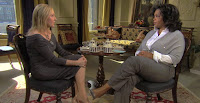 Something about JK Rowling has always been fascinating to me. Maybe it’s knowing her roots or looking at how connected she still is to her roots, maybe it’s having watched how she handled the perils of instant worldwide fame with such class, or maybe because I love the Harry Potter books and it’s fun to know more about the author behind that series.
Something about JK Rowling has always been fascinating to me. Maybe it’s knowing her roots or looking at how connected she still is to her roots, maybe it’s having watched how she handled the perils of instant worldwide fame with such class, or maybe because I love the Harry Potter books and it’s fun to know more about the author behind that series.
Rowling’s Harry Potter series has sold over 400 million copies in 69 languages and 200 countries around the world. Book 7, Harry Potter and the Deathly Hallows, is the fastest-selling book of all time with 8.3 million copies sold in its first 24 hours. Oprah credited her with doing more for literacy than anyone else on the planet.
So I really looked forward to her interview with Oprah. Though I’m not a big Oprah fan, there are few people who do meaningful interviews as well as her. And I think there were some excellent things said. A few highlights:
* About failure: “Failure is so important. We speak about success all the time. It is the ability to resist failure or use failure that often leads to greater success. I’ve met people who don’t want to try for fear of failing.”
* Also on failure: “I’ve often met people who are terrified – you know, in a straitjacket of their own making – because they’d rather do anything than fail. They don’t want to try for fear of failing. [Hitting] rock bottom wasn’t fun at all – I’m not romanticizing rock bottom – but it was liberating. What did I have to lose?”
* Describing her lessons following the failure of her first marriage: “I am proud that it taught me that I had a strong survival instinct. I had a very tiny baby and walked right into poverty and depression. I did a lot of thinking after that marriage ended.” She also said that she would do the marriage all over again, if only because it gave her Jessica, her daughter.

* Oprah and Rowling discussed Michael Jackson who spent the balance of his career “chasing the phenomenon” of Thriller, a tragedy in itself. Rowling said she was content with her success: “I am proud that I did it [Potter], but this is a new phase.”
* Does Rowling feel she has to top Harry?: “No, people don’t ask me that. They tell me that. I really truly don’t think that. It was amazing, it was insane at times. I am so grateful I had it on so many levels. I love the people who read the books. I dedicated part of the last book to them – the ones who have stayed with Harry the whole time.”

* On happiness, she references Dumbledore’s words to Harry: “’The happiest man alive would be able to look into the mirror and see himself exactly as he is.’ I’d have to say I am pretty close [to that].”
* On the death of Rowling’s mother: “The books wouldn’t be what they are if she hadn’t died. At least half of Harry’s journey is dealing with death. It’s there on every single page. If she hadn’t died I don’t think it is too strong to say there wouldn’t be Harry Potter.”
* On her confidence in the success of the series: “I had this moment where I suddenly thought – it was like another voice speaking to me – and the voice said: ‘The difficult thing is going to be to get published. If it’s published, it will be huge. And that is exactly what it was.”
* On the day of 9/11 she emailed her editor, Arthur Levin, who responded to her almost immediately. The last line of the response read: “And they say we shouldn’t teach children about evil.”
* Rowling said the great gift money has given her is freedom from worry: If you’ve ever been there, you will never, ever take for granted that you don’t need to worry. Never.”
* On fame, Rowling compared herself being one of the Beatles: “Except there were four Beatles, so they could turn to each other and say, ‘My God, this is crazy.’ I couldn’t turn to anyone. So the pressure was insane…I kept saying to people, ‘I’m coping, I’m coping.’ But the truth was, there were times when I was barely hanging on by a thread.”
* On love: Love wins. It does win; we know it wins. When the person dies, love isn’t turned off like a faucet. It is an amazingly resilient part of us.”
* On whether she will continue writing: “Oh God, definitely. I literally I can’t stop. You could tie my hands to my sides. I need it for my mental health. I can’t stop.”